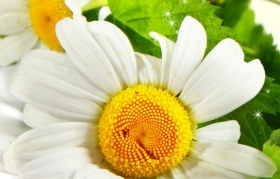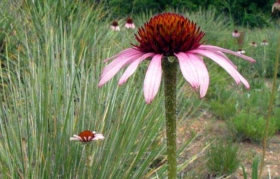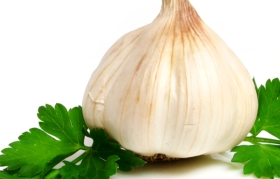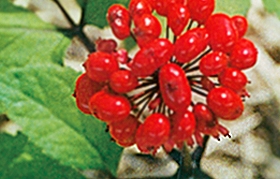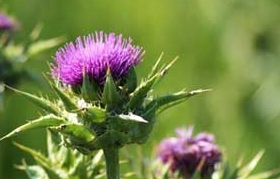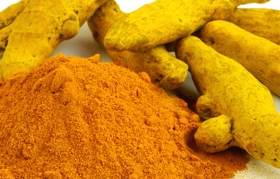Common Herbs Are Natural Herbal Remedies
Herbal medicines are preparations derived from naturally occurring plants with medicinal or preventative properties. Eighty percent of the world’s population use herbal medicine for some aspect of their health care. (Heber, D. et al., 2008). Due to the adulteration of many of today’s herbal supply, do buy your herbs from a trusted source and have a reputable herbalist as a mentor.
- Aloe Vera
-
Parts Used: Sap or juice, leaves
Primary Uses: Internally – constipation, digestive problems, colic; externally – burns, eczema, psoriasis, inflammation, wound healing.
Contraindications: Intestinal obstruction, Crohn’s disease, colitis, appendicitis, abdominal pain of unknown origin.
- Bilberry (Vaccinium Myrtillus)
-
Parts Used: Leaves, fruit
Primary Uses: Prevention and treatment of Diabetes Mellitus; complaints of the gastrointestinal tract, kidney and urinary tract, arthritis, gout and dermatitis, diarrhea, varicose veins, retinopathy, cataracts, circulation.
Contraindications: None known when administered properly. It is not known to interact with commonly prescribed drugs.
- Black Cohosh (Cimicifuga Racemosa)
-
Parts Used: Root, rhizones
Primary Uses: Menopausal ailments, menstrual and pre-menstrual problems, bronchial problems (such as whooping cough), and arthritis.
Contraindications: None known when administered property; high does can lead to vomiting, headache, dizziness, and nausea. Should not be used by pregnant or nursing mother, except during the last couple of weeks of pregnancy. Women taking estrogen therapy should consult a physician before use.
- Burdock (Arctium Lappa)
-
Parts Used: Root, stems, seeds
Primary Uses: Gastrointestinal complaints; as a diaphoretic and diuretic; acne, rheumatoid arthritis; externally, for psoriasis.
Contraindications: None known when administered property. Possible sensitization via skin contact. Should not be used during pregnancy or lactation.
- Cascara Sagrada (Rhamnus Purshiana)
-
Parts Used: Bark
Primary Uses: Constipation; as a tonic for the liver and digestive system.
Contraindications: During pregnancy and lactation; intestinal obstruction; appendicitis.
- Cat’s Claw (Uncaria Tomentosa)
-
Parts Used: Bark, roots, leaves
Primary Uses: Internally – inflammatory disorders, viral disease, allergies, arthritis, rheumatism, cancer, AIDS and other immune-related disorders.
Contraindications: During pregnancy and lactation; Children 3 years old or younger.
- Cayenne (Capsicum)
-
Parts Used: Fruits
Primary Uses: Externally – for muscular tension, and osteoarthritis; internally – for gastrointestinal disorders, fever, diabetic neuropathy, circulation and shingles.
Contraindications: Possible ulcers when administered excessively. Except for mild burning during the first few applications, there are no side effects from use of the capsaicin cream. To reduce burning sensation combine with Aloe Vera gel. Avoid contact with eyes and other sensitive areas.
- Chamomile (Chamomilla Recutita)
-
Parts Used: Flowers, Essential oil
Primary Uses: Internally – common cold, digestive upsets, motion sickness, irritable bowel syndrome, insomnia, peptic ulcers, colic, diarrhea; Externally – wounds, burns, hemorrhoids, eczema, canker sores, skin irritations, blocked tear ducts.
Contraindications: People with allergies to plants of the Asteraceae family (ragweed, chrysanthemum and aster) should avoid the use of Chamomile.
- Cranberry (Vaccinium Macrocarpon)
-
Parts Used: Fruit
Primary Uses: Internally, for urinary tract infections, incontinence, prevention of kidney stones and to remove toxins from the blood.
Contraindications: Should not be used as a substance for antibiotics during an acute urinary tract infection.
- Dong Quai (Angelica Sinensis)
-
Parts Used: Roots
Primary Uses: Menstrual disorders, PMS, post-partum and menopausal complaints, anemia, arthritis, loss of appetite, dyspepsia, fibrocystic breast disease, cardiovascular health, liver support.
Contraindications: May cause some fair-skinned persons to become sensitive to sunlight. Should not be used during pregnancy and lactation.
- Echinacea (Echinacea Angustifolia)
-
Parts Used: Roots, leaves, flowers, seeds
Primary Uses: Common cold, influenza, cough/bronchitis, fever, urinary tract infections, wounds, burns, psoriasis, eczema, Crohn’s disease, gingivitis, recurrent ear infections, yeast infections, cancer sores, immune related disorders.
Contraindications: People suffering from autoimmune disorders (such as Lupus) or other progressive diseases (such as multiple Sclerosis or tuberculosis), should not take Echinacea without their physician’s consent.
- Evening Primrose (Oenothera Biennis)
-
Parts Used: Leaves, stem bark, flowers, pods, oil
Primary Uses: Whooping cough, asthma, digestive problems, menopause, eczema, acne, coronary artery disease, complications of diabetes, breast pain and tenderness, PMS.
Contraindications: Schizophrenia, epilepsy. Stomach upset and nausea can occur when administered in excess.
- Feverfew (Tanacetum Parthenium)
-
Parts Used: Leaves
Primary Uses: Migraine, headache, digestive and menstrual cramps, arthritis; also, as an antiseptic and insecticide.
Contraindications: Children under the age of two, pregnant and lactating women. People with allergies to the aster, daisy, and sunflower group should take with caution.
- Linseed Flax (Linum Usitatissimum)
-
Parts Used: Seeds, oil
Primary Uses: Chronic constipation, diverticulitis, gastritis, bronchial complaints, cough, sore throat, burns, boils, abscesses, allergies, autoimmune diseases, arthritis, psoriasis, high cholesterol.
Contraindications: Flaxseed should not be used when there is bowel obstruction. Flaxseed oil has no known contraindications.
- Garlic (Allium Sativum)
-
Parts Used: Bulb
Primary Uses: Arteriosclerosis, overall cardiovascular health, high cholesterol, hypertension, cancer protection, colds and flu, diabetes, recurrent ear infections, yeast infections, cough/bronchitis, fever, oral inflammation, skin and fungal infection.
Contraindications: None known when administered properly, however it may cause flatulence and heartburn on some people.
- Ginger (Zingiber Officinalis)
-
Parts Used: Roots, rhizome
Primary Uses: Arteriosclerosis, loss of appetite nausea, morning sickness, chemotherapy support, migraines, motion sickness, rheumatoid arthritis, heart health, colds, cough, influenza, menstrual cramps.
Contraindications: Gallstone conditions.
- Ginkgo (Ginkgo Biloba)
-
Parts Used: Leaves
Primary Uses: Alzheimer’s disease, memory and brain function, atherosclerosis, asthma, allergies, circulatory complaints (varicose veins, irregular heartbeat), tinnitus, multiple sclerosis, migraines, diabetes, depression, macular degeneration.
Contraindications: Caution may be advised for people with blood-clotting disorders.
- Ginseng (Panax Ginseng)
-
Parts Used: Roots
Primary Uses: Loss of appetite, insomnia, stress, exhaustion, environment stress, concentration, overall health and vitality, recovery after illness.
Contraindications: High blood pressure, pregnancy, lactation. Excess may cause headaches and restlessness.
- Goldenseal (Hydrastis Canadensis)
-
Parts Used: Rhizomes, root
Primary Uses: Common cold, sore throat, Crohn’s disease, peptic ulcers, digestive disorders, sinusitis, excessive or painful menstruation, eczema, ear inflammations, vaginal infections, gum disease and canker sores, parasitic infections, urinary tract infections, recurrent ear infections.
Contraindications: Pregnancy and lactation.
- Green Tea
-
Parts Used: Leaves
Primary Uses: Diarrhea, dysentery, hepatitis, gastroenteritis, lowering of blood pressure and cholesterol, cancer prevention, gingivitis, infections, overall well-being; may be used externally for sore eyes, minor injuries, and insect bites.
Contraindications: None known when administered properly. Excess consumption can cause irritability and insomnia due to its caffeine content. Not suitable for infants.
- Hawthorn (Crataegus Spp.)
-
Parts Used: Flowers, leaves, fruit
Primary Uses: Circulatory disorders and heart disease; heart rate and blood pressure regulation, recovery after a heart attack.
Contraindications: None known when administered properly. Consult a professional before when taking heart medications, as the dosage may need to be adjusted.
- Licorice (Glycyrrhiza Glabra)
-
Parts Used: Roots, rhizomes
Primary Uses: Asthma, bronchitis, cough, peptic ulcer, arthritis, viral liver inflammation, canker sores, fibromyalgia, indigestion, heartburn, herpes simplex. Externally for eczema and psoriasis.
Contraindications: Liver disorders, high blood pressure, diabetes, pregnancy, lactation, extreme tension of the muscles or arteries, and low potassium levels.
- Milk Thistle (Silybum Marianum)
-
Parts Used: Seeds
Primary Uses: Loss of appetite, liver and gall bladder complaints, gall stones, jaundice, hepatitis, liver damage, cirrhosis, chemo-therapy side effects, psoriasis, type II diabetes.
Contraindications: None known when administered properly. People with diabetes should carefully monitor their blood glucose and may require reduction in standard anti-hyperglycemic agents when taking Milk Thistle.
- Mullein
-
Parts Used: Leaves, flowers
Primary Uses: Cough, whooping cough, bronchitis, sore throat, laryngitis, tonsillitis, asthma, influenza, chest congestion, tuberculosis, urinary tract infections, anxiety, insomnia, recurrent ear infections, wound, boils, rheumatic pain, hemorrhoids, and common cold.
Contraindications: None known when administered properly.
- Psyllium (Plantago Ovata)
-
Parts Used: Seeds (hulls)
Primary Uses: Constipation, colitis, ulcers, high cholesterol, heart disease prevention, hemorrhoids.
Contraindications: Some people could be allergic to Psyllium. May cause gas and bloating, if taken in large doses before the body has a chance to adjust to it.
- Red Clover (Trifolium Pretense)
-
Parts Used: Flower, leaves
Primary Uses: Eczema, cough, whooping cough, psoriasis, cancers prevention, gout.
Contraindications: Pregnancy and lactation. Fermented Red Clover should be be avoided as it may cause bleeding.
- Saw Palmetto (Serenoa Repens)
-
Parts Used: Berry
Primary Uses: Impotence, low sex drive, benign prostate conditions, cystitis, bronchial complaints.
Contraindications: None known when administered properly.
- St. John’s Wort (Hypericum Perforatum)
-
Parts Used: Flowers, leaves
Primary Uses: Anxiety, mild to moderate depression, insomnia, menopausal and pre-menstrual complaints, shingles, herpes, sciatica, blunt injuries, wounds, burns, bruises and recurrent ear infections.
Contraindications: Should not be taken with prescription antidepressants or during pregnancy and lactation.
- Tumeric (Curcuma Longa)
-
Parts Used: Rhizomes, Roots
Primary Uses: Cancer protection, bursitis, headaches, flatulence, jaundice, nose bleeds, diarrhea, fever, bronchitis, colds, internal hemorrhage, painful menstruation, shock, angina, rheumatoid arthritis and other inflammatory disorders; Also for skin and oral inflammations, infected wounds and bruising.
Contraindications: People with known gallstones should take with caution.
- Valerian (Valeriana Officinalis)
-
Parts Used: Roots, rhizomes
Primary Uses: Insomnia, hysteria, hyperactivity, anxiety, cramps, muscular tension and spasms, migraine, hypertension, painful menstruation, colic.
Contraindications: With other sedative drugs and /or anti-depressants and/or alcohol.


